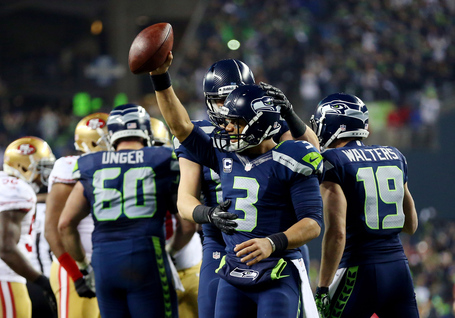
The No. 1 defense of the Seahawks will face the No. 1 offense of the Broncos on Sunday, and history would suggest that Seattle has the advantage.
The clash of the unstoppable force against the immovable object will be on display like never before in Super Bowl history when the Denver Broncos and Seattle Seahawks face each other on Sunday. While the top scoring offense has faced the top scoring defense in the past, and the top offense in total yardage has faced the top defense in total yardage, never have both been true in one game.
Seattle held teams to an average of 14.4 points per game during the regular season, allowing 273.6 yards per game. The Broncos managed to score 37.9 points and rack up 457.3 yards of total offense.
History favors the Seahawks though, as defenses have tended to win the titanic battles of top units in the Super Bowl.
In the four times that the top scoring offense has met the top scoring defense in the Super Bowl, the defensive-minded team has come out on top. The sole exception was Super Bowl XXIV, as the 49ers offense had no problem scoring points against the top-ranked Broncos defense.
Only once has the top defense in total yardage allowed faced the top offense in total yardage gained, and the defensive-minded Buccaneers dominated the offense of the Raiders in Super Bowl XXXVII.
Super Bowl XIII (1979) - Steelers 35, Cowboys 31
The Cowboys averaged a league-best 24 points during the 1978 regular season and surpassed that mark against a Steelers defense that allowed just 12.2 points per game and gave up just 15 points in the two previous postseason games. However, the 5th-ranked Pittsburgh offense was no slouch and found plenty of success against the Dallas defense that finished the season with the third-fewest points allowed. Steelers quarterback Terry Bradshaw racked up 318 yards and four touchdowns to win the Super Bowl MVP Award, while Cowboys quarterback Roger Staubach finished with 228 yards and three touchdowns.
Super Bowl XIX (1985) - 49ers 38, Dolphins 16
The Dolphins averaged 32.1 points per game and were never held under 21 points during the 1984 season. That was, until they faced the top-ranked 49ers defense that held them to less than half of their season scoring average. The AP NFL MVP for the 1984 season, Dan Marino, racked up 318 yards through the air on 50 pass attempts, but tossed two interceptions and just one touchdown.
Super Bowl XXIV (1990) - 49ers 55, Broncos 10
San Francisco's 55-point offensive outburst is the most points any team has scored in a Super Bowl, and the 49ers did it against a team that allowed just 16.1 points per game. While the 49ers offense was aided by four turnovers, there was little doubt about the offensive prowess of the team, as Joe Montana threw five touchdowns, in addition to three rushing touchdowns from the combination of Roger Craig and Tom Rathman.
Super Bowl XXV (1991) - Giants 20, Bills 19
The Bills weren't offensively inept against the top-ranked defense of the Giants, but 19 points was far from the 95 points Buffalo racked up in the two postseason games prior. The only touchdown of the game for the Bills came on a 31-yard rush from Thurman Thomas that gave Buffalo the lead, but Jeff Hostetler managed to drive the Giants into field goal range with eight minutes to go that proved to be the game-winning score for New York.
Super Bowl XXXVII (2003) - Buccaneers 48, Raiders 21
The 2002 Buccaneers defense allowed just 12.3 points per game to carry a below-average offense to the Super Bowl. There, they shut down an Oakland offense that averaged nearly 400 yards per game, intercepting quarterback Rich Gannon five times. the Tampa Bay defense was so dominant in the showing that it produced plenty of scoring of its own -- returning three Gannon interceptions for touchdowns -- and held the Raiders rushing attack to just 19 yards.
More from SB Nation NFL
• SB Nation's complete coverage of Super Bowl XLVIII
• Stupid things they're saying about the Super Bowl
• NFL mock draft: Blake Bortles is the new No. 1 pick
• Nick Foles, Derrick Johnson named Pro Bowl MVPs | Weird ending
• Longform: How prop bets changed the way we gamble on the Super Bowl
